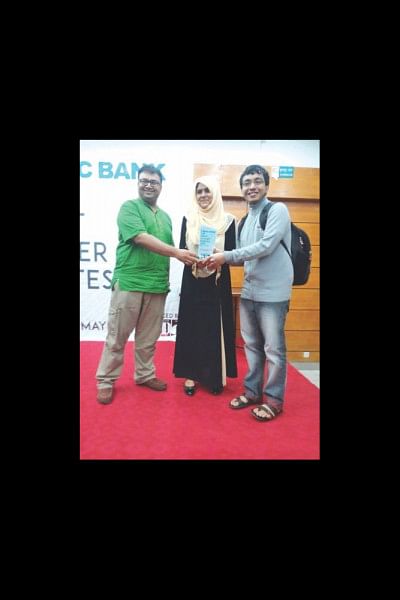Dialogue and Discourse

The importance of debating in the development of thinkers and leaders has been stressed repeatedly. But what is not stressed often enough is that it also opens the gate to dialogue. Bangladesh stands at a point where conversations about gender issues have become a necessity, especially for the youth. This very need for discourse was at the heart of the "BRAC Bank Great Gender Debates", which was held from May 28 to 30 on BRAC University campus.
The open tournament was organised by the BRAC University Debating Club (BUDC) with assistance from the Bangladesh Debating Council (BDC). The main agenda of the tournament was to highlight the importance of gender issues.
The Bangladesh debating community happens to have a smaller proportion of women when it comes to active debating. The gender debates required all participating teams to have at least one or all female members. "Normally in tournaments, female participation is around 30 to 40 percent, but this tournament had more than 50 percent. We made it a point to ensure that more women debaters participate," said Nabil Hasan, President of BRACU's Debating Club.
The debates took place with the participation of mostly current university level debaters along with ex-debaters who now hold jobs and a number of school students.
The championship title was won by Noshin Saiyara, a class-10 student at Viqarunnisa Noon School & College and Sheikh Rifayet Daiyan Srijon from St. Joseph Higher Secondary School who has just completed his SSC. The team, named "Potterish Farts", secured the winner's position after defeating teams of both current and ex university level debaters in the final rounds.
"It was an empowering experience for us. Winning the finals against experienced seniors was an important reminder as debaters that: you don't debate people, you debate arguments. The gender debates made me consider how gender stereotypes affect men and is not limited to being a women's issue," Srijon said.
"Winning this tournament was a point of affirmation as a feminist for me. And it was an honour to debate against the seniors from whom I've learned the finer points of debating," Noushin chimed in.
The other finalist teams were: Rishad Sharif and Masrura Oishee, Aaqib Farhan Hossain and Iffat Sumaiya, Sumaiya Anjum Kashfi and Ahmed Shafquat Hassan.

Syed Muskit Razee, from Islamic University of Technology (IUT), was declared as 'the best speaker of the tournament' and Noshin Saiyara as 'the best speaker of the finals'. 'Best female speaker' was a special award of the Gender Debates and won by Ming Khan from Cornell University. 'Best adjudicator of the tournament' was awarded to Arghya Dev Aryan, an ex-student of BRAC University and member of BUDC.
The debates circled around several issues of gender, sexuality and violence. The motions were structured to guarantee the exposure of feminist dialogues and literature for the debaters and spark conversations on marketing sexuality, commercial surrogacy to LGBT communities.
The semi-final and final rounds put into perspective the issues of dealing with misogynistic statements and the co-existence of women's liberation and organised religion.
The tournament had the added benefit of plenary sessions held on May 29 and 30, in between debate rounds. Nabil Hasan shed light on the introduction of plenary sessions in the tournament: "Debates don't usually offer reality checks; it's more about constructing arguments and getting your point across to the adjudicating panel. We hoped that these sessions would provide insights into how our theories and arguments play out realistically in the world."
The first session held on the 29th was on the relationship of gender, culture and violence. Dina Siddique, Professor of Anthropology at BRAC University, was the guest speaker at the session. She discussed how violence against women is not simply a side-effect of patriarchy: "Think about violence as being structural and characterised by class privilege, power and a culture of impunity. How vulnerable women are to public violence is determined by all these factors."
The next session was conducted on the 30th by Firdous Azim, chairperson of BRAC University's English and Humanities Department and a strong advocate of women issues. The session focused on the prevention and actions taken against incidences of sexual violence. Many in the audience had questions on how to tackle situations when faced with lack of co-operation from the legal system.
"Attitude towards sexuality is skewed in this country and that needs to change. We need to work towards establishing mutual respect and I think that is a very important agent of change," Professor Azim said during the session. She stressed the importance of active participation of the youth in addressing these issues at a social level.
"I learned a lot from the plenary sessions and have come to somewhat idolise the two women who spoke at the sessions. I'm glad to be a part of such a brilliant effort from the BRAC community to help tackle some major gender issues around us," said Ahmed Shafquat Hassan, a student of LCLS.
Bangladesh's debating community is equivalent to one big, rambling family strung together by the shared passion for debate. It has developed immensely in recent years, making a place for Bangladesh in international tournaments and circles.
Ishrat Jahan writes things and often gets mistaken for a twelve-year-old. When she isn't living inside a book, she tries to understand economics. You can reach her at: [email protected]

 For all latest news, follow The Daily Star's Google News channel.
For all latest news, follow The Daily Star's Google News channel. 



Comments